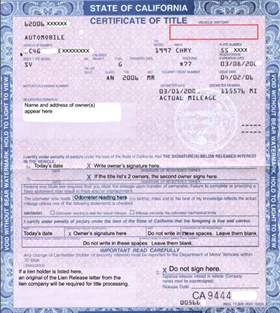Automobile Financing
Lenders Double Down on Car-Title Loans Attempting to Stay Ahead of Regulators
by Nancy Osborne, COO of ERATE®
(6/28/2013) As consumers continue to struggle in an economy slow to recover, suffering from bad credit and scarce savings, short term loans such as payday and car-title loans remain an answer to a desperate need for quick cash. Until recently the lenders operating in this market have been able to work around state usury laws unlike banks and credit card issuers. Yet just as payday loans have come under the increased scrutiny of regulators, many of the lenders occupying that market have quickly shifted their focus onto car-title loans, also referred to as registration or auto-equity loans. Roughly one million consumers take out car-title loans totaling $6 billion each year. Twenty one states throughout the country permit car-title loans, which largely avoid examination by state regulators unless a consumer complaint is filed against a lender. 
The car is the security for the loan
Car-title loans, as the name implies, are secured by using a consumer's vehicle as collateral for the loan. However a free and clear title on the vehicle is not required to obtain a car-title loan, only an owner's proof of registration is needed. If there is already purchase financing on the vehicle, then just like a homeowner obtaining a second mortgage, the car-title lender is in second position. A car-title loan can be obtained in as little as 30 minutes, as the process is essentially unregulated and lenders do not verify employment, credit or even consider a consumer's ability to repay the loan. A consumer is typically permitted to borrower up to a quarter or 25% of the value of the vehicle.
Short term loan becomes costly in the long run
The average car-title loan is reportedly in the range of $950-$1300, which is three times higher than the average payday loan of $350. Like payday loans, the rate on a car-title loan will vary based upon the length of the loan which can run anywhere from a month to a year. Rarely are the loans repaid within a month as the average period of repayment is closer to 10 months.
 It is important to note that a monthly rate of 25% can result in an Annual Percentage Rate (or APR) of 300%;
It is important to note that a monthly rate of 25% can result in an Annual Percentage Rate (or APR) of 300%;
therefore with an average loan amount of $950 and a typical repayment period approaching 10 months, a car-title loan consumer could spend roughly several thousand dollars for the loan. One consumer, who reportedly resided in a state that requires an interest rate cap on car-title loans, took out a loan for only $2,000 for six months and had to repay $1550 in interest alone, a rate just over 150%. An interest only payment option can appear to be a good deal to a consumer but can come as a shock to someone who doesn't understand that they will be faced with a balloon payment of the original loan amount at the end of the interest only period. The typical car-title loan consumer will refinance their loan an astonishing eight times within a year!
Borrowers may lose their car
Because a car-title loan is secured by the title on the consumer's vehicle, defaulting on the loan can result in the permanent loss of the vehicle and in fact, in the process of securing the loan, a consumer may be required to provide the lender with a key to the car to facilitate the ease of repossession should the need arise. Vehicles may even be set up for geo-location by the lender so they can easily be found in the event repossession is required.
It is reported that roughly 17% of car-title loans end up requiring repossession. If the lender should repossess and sell the vehicle, the lender may also be entitled to keep any amount collected in excess of the outstanding loan balance, as some states permit this, leaving the consumer without a car and with any equity they had in the vehicle now lost.
When states cap the max rate, lenders disappear
As suggested previously, some states mandate interest rate caps on car-title loans, most in the range of 200 to 300%. It is noteworthy that as states have proceeded with initiating rate caps on payday and car-title loans, the number of lenders offering these loan products drops significantly, roughly in half. Some states are looking to cap the interest rate in the 36% range, vastly lower that the current average. The interest rate on a car-title loan is less than that of a payday loan, namely because the loan is secured by an asset, the consumer's vehicle. Car-title lenders justify charging high rates because of the high risk of default and high number of uncollectable loans, which averages between 15%-17%. In a pattern that closely resembles that of payday lenders, there is a heavy concentration of car-title lenders in minority and low income neighborhoods with a higher than average number of residents on public assistance. Though the lenders of both payday and car-title loans have claimed that their high rates are justified due to the short term nature of the loans, rarely is the repayment of the loan made within the original time frame set up at the beginning of the loan. It is misleading at best for a consumer to be persuaded to believe that the original payment plan is realistic and this is why regulators are cracking down on misrepresented, short term predatory loan products like payday and car-title loans.
The growing popularity of car-title loans raises significant concerns about the potential exploitation of vulnerable consumers. These loans often target individuals who are already struggling financially, offering quick cash at the cost of extremely high interest rates and the risk of losing their vehicle. The lack of regulation and oversight in this industry allows lenders to operate with little accountability, leaving borrowers with few protections. As more states consider implementing interest rate caps and other regulations on car-title loans, it is crucial to prioritize consumer welfare and prevent predatory lending practices. Policymakers and consumer advocates must work together to find solutions that provide access to affordable credit while safeguarding the financial well-being of all consumers.
 Nancy Osborne has had experience in the mortgage business for over 20 years and is a founder of both ERATE, where she is currently the COO and Progressive Capital Funding, where she served as President. She has held real estate licenses in several states and has received both the national Certified Mortgage Consultant and Certified Residential Mortgage Specialist designations. Ms. Osborne is also a primary contributing writer and content developer for ERATE.
Nancy Osborne has had experience in the mortgage business for over 20 years and is a founder of both ERATE, where she is currently the COO and Progressive Capital Funding, where she served as President. She has held real estate licenses in several states and has received both the national Certified Mortgage Consultant and Certified Residential Mortgage Specialist designations. Ms. Osborne is also a primary contributing writer and content developer for ERATE.
"I am addicted to Bloomberg TV" says Nancy.
Refinance at Today's Low Rates!
Other related articles:
Need Cash Fast? Beware of Greedy Lenders Waiting to Exploit You
Beware payday loan 'alternatives'
Zero interest credit cards quickly melt down
Consumers want financial protection agency
Small loans cost consumers big bucks

Automotive Loans: Trading in a Car
Automotive Loans: What Laws Protect Car Buyers?
Automotive Loans: Trade In or Sell a Car?
Automotive Loans: Is Zero Percent Financing Really Possible?
Automotive Loans: Determining a Down Payment
Automotive Loans: The Truth About "Add-Ons"
Automotive Loans: Top 5 Mistakes When Buying a Car
Automotive Loans: Shopping Online
Automotive Loans: Dealer Incentives to Buy
Automotive Loans: Car Buying Incentives
Automotive Loans: Should You Buy New or Used?
Automotive Loans: What to Know About Interest Rates
Automotive Loans: Negotiating a Loan with a Dealer
Automotive Loans: How Much Car Can You Afford?
Automotive Loans: Understanding Typical Loan Language
Automotive Loans: Types of Financing
Automotive Loans: Buying Vs Leasing
Automotive Loans: Applying for a Car Loan

Buying a Car: Standard and Extended Warranties
Car Buying: Financing Background and Steps
Leasing a Car: Two Types of Leases - Closed & Open
Buying a Used Car: Two Options
Buying a Car: 5 Steps to Find the Perfect Deal
Automobile Buying/Financing

5 Steps to Find the Perfect Car
Auto loan defaults to rise 7 percent in 2010
Auto Show Season Tips for Buyers
When is the Best Time to Buy a New Car?
Making a Vehicle Purchase? Enjoy These Helpful Tips
Chances are, your next car will be used. Drive a hard bargain
What your car is really saying
2012 President's Day auto sales among best ever
Special Report: Hitting the Brakes on Auto Dealer Loans
Auto Insurance
Buying Ins - Shopping for Insurance
Best Car Insurance Plan for You


